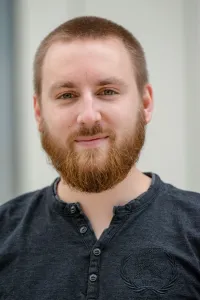
Johannes Brzeszniak studiert Geowissenschaften im 6. Fachsemester. Sein angestrebter Abschluss ist der Bachelor of Science, 1-Fach.
Wieso haben Sie sich damals für Ihr Studienfach entschieden?
In erster Linie, weil ich vorher Maschinenbau studiert habe und ich mir bei den Geowissenschaften am meisten anrechnen lassen konnte. Es stellte sich jedoch schnell heraus, dass es ein zufälliger Treffer genau ins Schwarze war. Die Geowissenschaften beschäftigen sich mit so gut wie allen Naturwissenschaften (Physik, Chemie, zum Teil auch Biologie) und bieten somit eine ungeahnte Vielfalt. Man beschäftigt sich mit den großen Zusammenhängen, z. B. die Entstehung und Entwicklung der Erde, aber man erfährt auch, was die kleinsten Bestandteile (z. B. Atomgitterstrukturen) damit zu tun haben.
An welchen Stellen haben sich die Erwartungen an Ihr Studienfach erfüllt, an welchen nicht?
Mir war bewusst, dass ein Studium nicht nur Sonnenseiten hat. Durch manche theorielastige Fächer muss man sich durcharbeiten. Da in jedem Semester aber auch speziell geowissenschaftliche Kurse angeboten werden, geht der Spaß nicht verloren.
Was macht Ihnen in Ihrem Fach am meisten Spaß?
Die familiäre Atmosphäre im Institut. Da wir in der Regel nicht sehr viele Studierende in einem Fachsemester sind, wächst man schnell zusammen. Die leider etwas weniger gewordenen, aber dennoch recht häufigen Geländeübungen helfen dabei, schnell viele Leute kennenzulernen. Auch die Professoren und wissenschaftlichen Mitarbeiter sind sehr umgänglich, wenn man sie mit dem angemessenen Respekt behandelt. Man munkelt auf der ein oder anderen Geländeübung wird dann auch schon mal ein Bier zusammen getrunken.
Was war bisher die größte Herausforderung?
Ein spannendes Thema für die Bachelorarbeit zu finden. Ich will damit nicht sagen, dass es keine spannenden Themen gibt, denn es gibt eine unglaubliche Vielfalt an Möglichkeiten. Ich suche jedoch etwas, was mich wirklich fesselt und begeistert.
Was wollen Sie einmal damit werden?
Stand August 2016 könnte ich mir denken Hydro- oder Ingenieurgeologe zu werden. Wobei die Geophysik, speziell die Explorationsgeophysik auch ein spannendes Feld ist. Ich lasse mich mal überraschen, wohin der Weg mich nach dem fertigen Master führt.
Welche Tipps geben Sie den Leuten, die auch überlegen, Ihr Fach zu studieren?
Viele Studienbeginner merken nach ein paar Semestern, dass der gewählte Studiengang doch nicht das hält, was man sich erhofft hat. Das erkennt man aber erst, wenn man es ausprobiert hat. Scheut euch nicht, zu einem anderen Fach zu wechseln. Alles was ihr macht sind Erfahrungen, die euch im Leben weiter bringen.
Zu den Geowissenschaften: Ihr interessiert euch für Naturwissenschaften, wollt euch aber nicht auf Physik, Bio, Chemie oder Mathe festlegen? Ihr habt Spaß daran auch mal nach draußen zu gehen und auf Geländeübungen euch buchstäblich durch die Wildnis zu kämpfen? Dann seid ihr bei den Geowissenschaften genau richtig. Hier lernt ihr, dass ein Stein nicht gleich ein Stein ist und dass es Vulkane und Erdbeben nicht nur auf Island und Japan oder in Südamerika gibt, sondern auch „bei uns um die Ecke“. Am Anfang müsst ihr euch vielleicht etwas durch die Grundlagen quälen, aber das ist nun mal in jedem Studium so und erfahrungsgemäß bei uns machbarer als beispielsweise bei den Bauingenieuren oder Maschinenbauern.
Als groben Einblick in die Geowissenschaften, gebt „Geowissenschaften“ einfach mal bei Wikipedia ein und ihr erhaltet einen guten Überblick über die Gebiete, in denen wir tätig sind.


